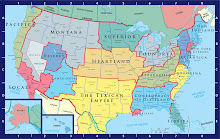
AREA
10,000 sq.m. (20th)
POPULATION
1,717,000 (17th)
DENSITY
172 people per sq.m. (8th)
CAPITAL
New Orleans
STATES
None
RELIGION
Catholic, Vudun, various
LANGUAGE
French-Cajun, English, various
NATL INCOME
40 billion
MEDIAN INCOME
$23,582 (19th)
ECONOMY
The economy of Neorleans is seriously struggling. Neighbor to two aggressive, hostile nations (Dixieland and Texico), Neorleans has so little farmland and industry that its only substantial export is shellfish. It is a member of the American Northeast Trade Union, and is highly reliant on it for necessarily cheap imports. Trade to and from the nation is also problematic; ships traveling north on the Mississippi pass through four other nations before reaching the ANTU bloc; however, Neorleans does control the mouth of the Mississippi and has levied substantial taxes on foreign ships, coming under heavy fire. It is also dependent on the channel between Florida and Cuba. Neorleans does have some strategic oil reserves and is mostly energy independent. It is also popular for its tourist trade in the city of New Orleans. Income is low, and a large portion of the populace is destitute. Cost of living is fairly low.
OVERVIEW
Neorleans was created by charter of the United Nations in 1992, out of land that had belonged to Dixieland. The heavily African-American population was coming into conflict with the administration of white Louisiana Governor David Duke, and the problem was exacerbated when foreign black activists like Jesse Jackson and Al Sharpton promoted the idea that blacks from all over Dixieland move to the city of New Orleans in order to overpower the electorate and elect a black state government. When their gambit worked and Ernest `Dutch’ Morial was elected, a white backlash ensued. Jackson was assassinated by white radicals, and the region fell into rioting. Governor Duke sent the National Guard in, with over a thousand deaths as a result. Dixieland was forced to give up a portion of the delta to the black separatists, while most of the remainder of Louisiana it would cede to Texico in the 1994 Redivision. Today, Neorleans is a struggling, poor nation, utterly dependant on trade with other nations. It has maintained its black majority in populace and elected officials. In 2007, much of the area was devastated by Hurricane Melissa, setting the struggling nation back even further, but ANTU and international aid prevented a total collapse. The nation has recently undergone an increased militarization, under perceived threat of annexation by both Texico and Dixieland.
HEAD OF STATE

Governor Donna Brazile,
Democratic-Equality Party

Lt. Gov. William Jefferson,
Democratic-Equality Party

No comments:
Post a Comment